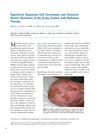 5 citations,
May 2006 in “Dermatologic Surgery”
5 citations,
May 2006 in “Dermatologic Surgery” Radiation therapy successfully treated an elderly man's skin cancer and pre-cancerous scalp lesions.
 2 citations,
September 2019 in “Dermatologic Surgery”
2 citations,
September 2019 in “Dermatologic Surgery” The two-step procedure of fat grafting followed by hair grafting improves scalp and facial scar correction.
 February 2008 in “Medical & surgical dermatology”
February 2008 in “Medical & surgical dermatology” Some treatments like topical oxygen and stem cells show promise for wound healing and hair growth, but evidence for modern dressings over traditional ones is limited.
 31 citations,
June 2020 in “Dermatologic Therapy”
31 citations,
June 2020 in “Dermatologic Therapy” Patients with chronic skin conditions on systemic treatments did not have worse COVID-19 outcomes and could resume their treatments after recovery.
 54 citations,
August 2009 in “Dermatologic Surgery”
54 citations,
August 2009 in “Dermatologic Surgery” Modern hair transplants use small grafts for a natural look and drugs to prevent further loss, with high patient satisfaction.
 67 citations,
October 1997 in “Dermatologic Surgery”
67 citations,
October 1997 in “Dermatologic Surgery” The EpiLight Hair Removal System removed about 60% of hair with some side effects, and more research is needed to confirm long-term effectiveness.
 June 2022 in “Journal of the turkish academy of dermatology”
June 2022 in “Journal of the turkish academy of dermatology” The COVID-19 quarantine in Turkey disrupted dermatological care, increased stress-related skin issues, and showed the need for psychological support and teledermatology.
256 citations,
March 2019 in “Journal of the American Academy of Dermatology” There is no standardized treatment for hidradenitis suppurativa, and individualized plans are needed.
 10 citations,
November 2017 in “Dermatologic Clinics”
10 citations,
November 2017 in “Dermatologic Clinics” More men are getting cosmetic procedures, mainly for aging, hair loss, and to keep masculine features, with growing interest in both surgical and noninvasive treatments.
 67 citations,
September 1997 in “Dermatologic Surgery”
67 citations,
September 1997 in “Dermatologic Surgery” The document concludes that good cosmetic outcomes in hair transplantation depend on the surgeon's artistic skill and careful planning.
 77 citations,
April 1999 in “Dermatologic Clinics”
77 citations,
April 1999 in “Dermatologic Clinics” The document concludes that follicular unit transplantation offers more natural results and better graft survival than older hair transplant methods.
 March 1989 in “International Journal of Dermatology”
March 1989 in “International Journal of Dermatology” Several medical books were reviewed, each praised for their contributions to their fields.

AI-assisted surgical robots improve surgery precision and safety.
 7 citations,
July 2019 in “International archives of internal medicine”
7 citations,
July 2019 in “International archives of internal medicine” Common skin conditions can greatly affect a person's mental health and social life.
 December 1989 in “The Journal of Dermatologic Surgery and Oncology”
December 1989 in “The Journal of Dermatologic Surgery and Oncology” New techniques and findings in dermatologic surgery show improved pain management, safer liposuction, better hair transplantation, and effective treatments for skin conditions.
 11 citations,
August 2020 in “Dermatologic therapy”
11 citations,
August 2020 in “Dermatologic therapy” The document concludes that mesotherapy can be effective for skin and hair treatments, but more research is needed to confirm its safety and effectiveness.
 34 citations,
July 1987 in “The Journal of dermatologic surgery and oncology”
34 citations,
July 1987 in “The Journal of dermatologic surgery and oncology” Improved dermabrasion techniques in 1987 led to better treatment results for skin issues like acne scars.
 4 citations,
October 2008 in “International Journal of Dermatology”
4 citations,
October 2008 in “International Journal of Dermatology” A toddler's chronic finger ulcer was successfully treated after removing a hair causing hair-thread tourniquet syndrome.
 March 2022 in “Brazilian Journal of Health Review”
March 2022 in “Brazilian Journal of Health Review” COVID-19 can cause a type of hair loss that usually starts 3-6 months after the illness, and treatment includes stress reduction and hair care products like Minoxidil.
 2 citations,
July 2008 in “Dermatologic Surgery”
2 citations,
July 2008 in “Dermatologic Surgery” The Cross-section Trichometer is a promising tool for measuring hair characteristics without cutting the hair and may have various clinical uses.
 29 citations,
March 2008 in “Dermatologic Surgery”
29 citations,
March 2008 in “Dermatologic Surgery” The Cross-section Trichometer is a new tool that can measure hair quantity and detect hair loss and growth.
 March 2017 in “InTech eBooks”
March 2017 in “InTech eBooks” Acne vulgaris is a common skin condition that can cause low self-esteem and depression, and early treatment is important to prevent scarring.
 1 citations,
November 2022 in “Journal of Dermatological Treatment”
1 citations,
November 2022 in “Journal of Dermatological Treatment” Platelet-rich plasma can increase hair density and may help treat some skin conditions, but it's costly, not FDA-approved, and needs more research.
 15 citations,
December 2007 in “Dermatologic Therapy”
15 citations,
December 2007 in “Dermatologic Therapy” Hair transplantation has improved with techniques that increase graft survival and patient satisfaction for more natural results.
 10 citations,
May 2008 in “Dermatologic Surgery”
10 citations,
May 2008 in “Dermatologic Surgery” Densely packed hair grafts can survive well using the lateral slit technique.
 10 citations,
February 2007 in “Clinical techniques in small animal practice”
10 citations,
February 2007 in “Clinical techniques in small animal practice” Dogs with sex hormone imbalances may not drink or pee a lot but often lose hair on their body and can have reproductive system issues.
 17 citations,
June 2011 in “Dermatologic Surgery”
17 citations,
June 2011 in “Dermatologic Surgery” Hair transplantation is an effective way to restore eyebrows.
81 citations,
January 2000 in “American journal of clinical dermatology” Various treatments can improve post-acne scars, but results vary.
 February 2018 in “Dermatologic Surgery”
February 2018 in “Dermatologic Surgery” Nonshaven follicular unit extraction is a highly satisfactory method for restoring pubic hair.
 8 citations,
July 2018 in “Current Sexual Health Reports”
8 citations,
July 2018 in “Current Sexual Health Reports” Finasteride can cause lasting sexual dysfunction, depression, and other side effects, needing more research for treatment.




























